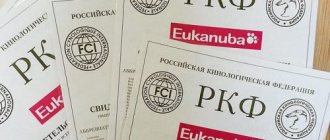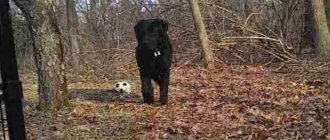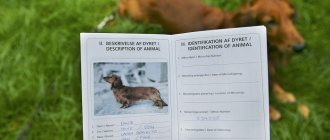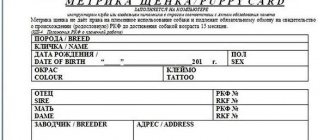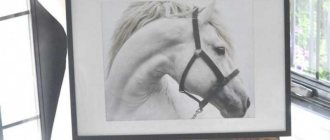The owner of a puppy or a person planning to purchase a dog will have to take care of documentary support for his pet. This means that the puppy or (in the future) the adult must have papers. And the owner should start preparing them on time.
This practice is accepted by dog breeders, breeders, and owners all over the world. The presence of certain forms confirms the authenticity of the breed, the absence of pathologies in the animal and allows you to export the pet outside the country. Of course, it will not be possible to obtain documents for a dog in one visit to the kennel club. To do this, you will have to meet some conditions. And then the dog owner will be given all the necessary forms.
What documents can be issued at RKF?
When getting a dog, the owner must think in advance about the prospects for participation in exhibitions, about plans for breeding development and maintaining the purity of the breed. All this is possible only if you have documents determining the purebred of the pet, its pedigree, and belonging to a certain breed. It is natural that such important information should be recorded and issued only by an organization competent in dog breeding matters. This is the Russian Cynological Federation - RKF.
Here you can get full advice on many issues, including what documents should be available for the dog. Moreover, not all forms are issued by this organization - some will have to be completed in other institutions. But some of them, relating specifically to the characteristics of the breed, purebred origin and pedigree, are issued in the document processing department of the RKF. So, what kind of RKF documents can be issued for a dog in this organization? Here is their list:
- Pedigree is a form confirming the purity of the breed and the animal’s compliance with its standards. A pedigree is an official extract from the All-Russian Unified Pedigree Book, entries in which are also kept by specialists from the Cynological Federation;
- working certificates are RKF documents confirming that a dog has qualities corresponding to its breed;
- breeding certificates - RKF documents indicating that the animal fully complies with the breed standards and can be used to reproduce offspring of this breed;
- diplomas of a participant in national exhibitions are documents from the RKF for a dog that took part in exhibition events within the state;
- diplomas of international champions - such documents are issued by the RKF for dogs participating in international events in the country or abroad;
- certificates of passing kerung - breeding selection, the requirements of which are established for representatives of the German Shepherd and Rottweiler breeds.
In addition, the federation issues other documents for the dog, confirming the conformity of the exterior and the absence of medical anomalies. Such RKF documents are an international certificate of the absence of dysplasia based on the results of testing of the elbow and hip joints, as well as a Patella certificate on the results of assessment of the elbow joints.
Let's take a closer look at how to properly register a dog.
Additional terms
In what case can an owner be denied registration of a mating? There are also a lot of reasons here. And the first is the lack of expert assessments. If the dog has a pedigree, and you want to breed it with the best representatives of the class, getting elite puppies, then you need to get the opinion of several experts at exhibitions about its compliance with breed standards. If there haven’t been any entries to the show, club specialists may suspect that your pet has disqualifying traits. This may be the absence of some teeth, cryptorchidism, excessive aggressiveness or fearfulness, or developmental defects.
Patella
This form is issued subject to two conditions. Firstly, the dog must be registered in the All-Russian Unified Pedigree Book. Secondly, RKF documents for a dog confirming the absence of pathologies of the elbow joints are issued only after a detailed examination by a veterinarian. Moreover, such a specialist must have an FCI license and the right to evaluate.
This document is issued to representatives of giant breeds upon reaching eighteen months of age, and to dogs of small, large and medium breeds - upon reaching one year of age. In the RKF, documents confirming the absence of Patella pathology are issued within 15 working days from the date of the clinical examination.
Certificate of kerung results
To obtain this document, the dog must undergo a special selection based on identifying working qualities, breeding merits, behavioral factors, and anatomical features of the breed.
This form is usually issued for breeding dogs of German Shepherds and Rottweilers after they have passed breeding selection. All events are carried out by specialists from the canine federation or Russian canine organizations according to a schedule approved by them. Dogs over 18 months of age are eligible for selection.
Draft about passing the breeding selection (Kerung) of the German Shepherd (Rkf.org.ru)
Draft document on passing the breeding selection (kerung) of the German Shepherd – page 2 (Rkf.org.ru)
Diplomas
Diplomas indicate the animal’s participation in exhibition events under certain programs for hunting, service, guard and other types of breeds. Each of them is assessed separately in accordance with the requirements of the program and exhibition classes.
Based on such documents, championship titles can subsequently be assigned, and certificates of achievements and victories in exhibitions can be issued.
It is possible to make such documents for a dog only if the owner has already previously obtained a pedigree for the dog from the RKF, and the pet itself has successfully passed all the competitive stages.
Diplomas are issued in national and international formats. In the first case, this is a certificate of participation in exhibitions on the territory of the Russian Federation, in the second case, this is confirmation of participation in international exhibition events.
List of documents for taking a dog abroad
The main document that is asked from animal owners when crossing the border correctly is Certificate in Form No. 1. It is issued by the State Veterinary Service on the basis of:
- veterinary passport;
- dog breeder's passports;
- providing the dog for inspection by service employees;
- evidence of the presence of a chip in the animal.
Important! The certificate allows you to transport any animal in public land or air transport.
In addition to Form No. 1, take with you:
- international dog passport;
- certificate in form 5a.
Certificate form 5a is needed for departure to the EU. It is issued if there is a certificate in Form No. 1, a chip and the owner’s foreign passport.
All documents for animals must be completed no earlier than 3 days before the trip. Certificate 5a is done before boarding a train, car or plane.
Sometimes customs officers, upon entering a foreign country, require you to present a document confirming that the dog does not have rabies (antibody test). It takes up to 10 days to receive it, so when planning a train trip, it is better to call the consulate or embassy and clarify the information you are interested in (contact the migration service).
Breeding certificates
Such a document is issued to dogs with a purebred pedigree, with confirmation in the form of certificates of the absence of dysplasia and other joint anomalies, and necessarily after passing a breeding examination. Applicants over 9 months of age and meeting all the characteristics of the breed are subject to this procedure. To issue a breeding certificate, RKF specialists need to check the dog’s pedigree, make sure that all documents are available, that the exterior and working qualities comply with breed standards.
To do this, you need to get positive marks at certificate shows and during breeding inspections.
Pedigree
To obtain a pedigree for a dog, you must contact the Russian Canine Federation, since kennel clubs and dog breeders’ associations do not issue such documentation. By the way, here you can also check the dog’s pedigree based on entries in the VERK - the All-Russian Unified Pedigree Book.
This document confirms that the animal fully complies with the breed standard, has pure roots without blood impurities, that is, it is a purebred offspring of its ancestors on the maternal and paternal lines.
How to make and receive a pedigree for a dog from the RKF?
To register a dog’s pedigree, several conditions and requirements must be met:
- the pet must be 6 months old;
- it must not be older than 15 months;
- the owner and the animal must be members of one of the kennel clubs, or the puppy must be taken from an official kennel. At the same time, clubs, federations and nurseries must be members of the RKF;
- from the first weeks of life, you need to make documents for the dog - puppy registration and veterinary passport;
- if the dog is an adult and has already participated in exhibitions and has certain differences, then it must have certificates of title assignment, which are included in the pedigree.
Upon reaching six months, the puppy’s metric can be exchanged at the canine center, federation, kennel club and receive a pedigree for the dog at the RKF. This can be done directly in the Russian Cynological Federation itself or in clubs and centers that are its members.
The document is issued after payment for RKF services, upon presentation of the receipt. At the same time, the metric is handed in, and the tear-off coupon from it remains with the dog’s owner.
Two pedigree options
Before registering a dog and receiving the necessary documents for it, you will have to choose one of the options for obtaining a pedigree:
- Certificate of origin of a single sample - this form is issued in English and Russian. Holders of such a document have the right to participate in international exhibitions and national exhibitions. This certificate confirms the right to use the dog for breeding. And if such a pedigree standard is available, the dog can be assigned all exhibition titles and issued certificates of national and international format. Such a pedigree indicates absolutely all information about the animal - name, date of birth, gender, color, owner data, titles, brand number and letter code, pedigree numbers of ancestors, test results.
Certificate of origin of the new sample (Rkf.org.ru)
- Certificate of registration of the dog in the All-Russian Unified Pedigree Book. If such a pedigree is available, a dog with an RKF passport has prospects only on a national scale: participation in domestic exhibitions, obtaining national titles and certificates. Such individuals do not participate in breeding activities, and their offspring cannot be registered in the records of the VERK.
New sample registration certificate (Rkf.org.ru)
To make a pedigree for a dog using one of the two available options, you must contact the management of the local canine center, dog breeding federation or dog breeding club, which are members of the Russian Canine Federation. The owner submits a written application, which is immediately accepted for consideration. You can find out whether a cynological organization belongs to such membership from the unified register on the RKF website.
The application must be accompanied by one more document – the puppy’s birth certificate. If you request a pedigree for a puppy purchased from one of the breeders in the RKF system, you will also need a veterinary passport received from the nursery along with the birth certificate.
How does the acquisition take place?
The process of buying a puppy usually occurs on the basis of a purchase and sale agreement. It can be either oral or written (Article 137 of the Civil Code of the Russian Federation). In European countries, the sale of a puppy is never complete without a written contract, while in Russia they often settle on an oral agreement.
If the seller is ready to draw up a purchase and sale agreement, you can be confident in his integrity and in the high quality of the purchased animal.
It is also worth noting that, on the basis of the Tax Code of the Russian Federation (Article 179), taxes are not collected from the offspring of one’s own dog.
Puppy metric (“puppy”)
To obtain a pedigree, it is necessary to present the so-called “puppy” - this is how dog handlers and dog owners call the puppy’s metric. This form is a kind of equivalent of a birth certificate for people. It is issued when the puppy reaches the age of 45 days and only after examination and evaluation by a dog handler.
Puppy metrics (kazvet.ru)
This document contains key information about the puppy:
- breed;
- nickname;
- Date of Birth;
- information about the breeder;
- data on origin - about both parents and place of birth;
- floor;
- color
Such a document is drawn up by the breeder himself, and all the hassle and expenses associated with this procedure fall solely on the shoulders of the nursery. Such a “puppy” for a dog is provided when it is necessary to make a pedigree for the dog at the kennel club.
The metric is filled out in Russian and English.
Why do ordinary dog breeders need genealogy?
A pedigree is required, strictly speaking, only to satisfy the ambitions of the owner and his business if, for example, he has organized a nursery and is breeding dogs. He needs a dog not only to give her unconditional love and receive reciprocal tenderness and affection, but also material benefit, a sense of significance.
For ordinary loving owners who have no idea what kind of tribe their favorite is, pedigree is not so important, because love for our smaller brothers is either there or not, and no papers with serious abbreviations and coats of arms will affect this. It is enough to visit the veterinarian regularly and have a basic set of documents. But for owners of purebred individuals, if there are plans for breeding, even if not for business purposes, it is better to take care of obtaining a pedigree.
Happy mongrel dog
Veterinary passport
One of the documents required for membership in cynological centers, obtaining a pedigree, participation in exhibitions and breeding activities is a veterinary passport. It is given to dogs of all breeds and ages in veterinary clinics.
A veterinary passport can be purchased with any cover; it is not regulated in any way. We found this option on ozon.ru.
This document contains information about the owner of the animal and the pet itself:
- type of animal (dog);
- suit and color features;
- age and date of birth;
- exact formulation of the breed;
- chipping data – code, date.
The sanitary and preventive treatments carried out are indicated on the double page of the veterinary passport. This includes deworming against internal and external parasites (worms, lice, fleas, ticks), as well as vaccination against viral and bacterial diseases. Vaccinations against rabies, distemper, viral hepatitis, infectious enteritis with different types of pathogens are usually indicated. The fact of vaccination is evidenced by labels from vaccine bottles pasted into the veterinary passport, with the serial number, name of the biofactory, name of the drug, date of manufacture and expiration date.
All this information is certified by the seal of a veterinarian, his signature and the stamp of the veterinary clinic.



